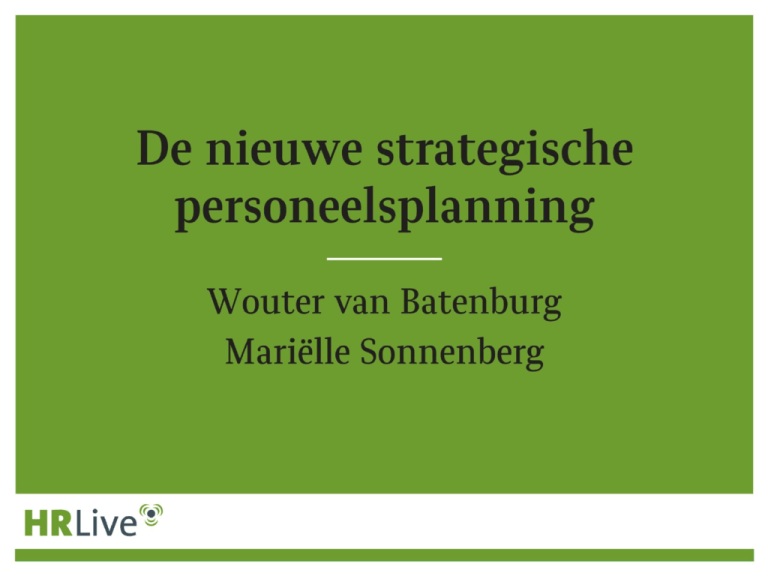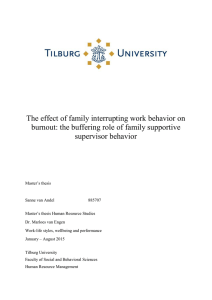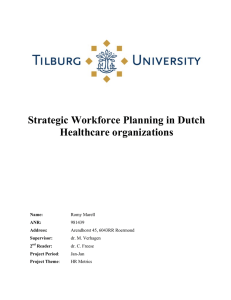In – door - en uitstroom
advertisement

Taskforce Arbeidsmarkt Taskforce Arbeidsmarkt Programma Management Werving Professionals Strategic resource planning - Kwantitatief - Kwalitatief Werving Starters Employer Branding Onderwijs, professionals en stagiaires Employer Branding voor Technici Boeien & binden Inzetbaarheid medewerkers Diversity In – door - en uitstroom Informatiebronnen voor strategische personeelsplanning • Conjunctuurprognose: CPB, CBS • Arbeidsmarktprognose: NOA (Nationaal Onderzoek Arbeidsmarkt), ROA (The Research Centre for Education and the Labour Market) • Verloopcijfers • Ziekteverzuim-, productiviteitscijfers • Leeftijdsopbouw, beoordelingsresultaten • Medewerkerpotentieel, MD programma, trainees • Engagement survey resultaten In- en uitstroomgetallen Bij een gelijkblijvende situatie Gemiddeld verloop Siemens NL (2010 – 2011) (zonder pensioneringen, bij gelijkblijvende markt): 4,5% medewerkers 96 Uitstroom en vervanging per jaar(!) door natuurlijk verloop verwacht (pensionering) 44 Totale gewenste instroom (ervaren en starters) medewerkers 140 Alle gewenste verdere veranderingen leiden tot extra instroom Arbeidsmarkt analyse (1) De beroepsbevolking vergrijst: (x 1000) Jaar Leeftijd 15 tot 25 25 tot 35 35 tot 45 45 tot 55 55 tot 65 2000 1873 2449 2530 2287 1590 2003 1921 2281 2589 2279 1834 2007 1957 2022 2574 2364 2047 2008 1973 1984 2533 2391 2089 De potentiële beroepsbevolking neemt af In 2008: 27,9% van de werknemers in de Metalektro gaat binnen 5 jaar met pensioen Siemens Nederland: 17% Bron: CBS Arbeidsmarkt analyse (2) • Relatief weinig werkloosheid onder technici: Werkloosheidspercentage technici: +/- 2% Landelijk werkloosheidspercentage: 5,4% (2011) • Weinig technische studenten (zie grafiek) Aantal studenten techniek en economie (bron: NOA, 2011) 18000 17000 16000 14000 • Ongeveer 45% van de technische studenten start in een niettechnische functie 12000 10000 9000 8000 6000 5000 7000 4000 2000 0 Student techniek WO Student techniek HBO Student economie WO Student economie HBO Leeftijdsverdeling Siemens Nederland maart 2012 450 400 350 300 250 200 aantal medewerkers 150 100 50 0 -19 20- 25- 30- 35- 40- 45- 50- 55- 6024 29 34 39 44 49 54 59 65 Strategic Workforce Planning complements existing approaches Five-year horizon (incl. yearly breakdown) Strategic Workforce Planning Focus on role shifts within selected "job families" Quantitative scenario approach for demand and supply side Definition of levers and key actions to close gap One-year horizon Resource planning Qualitative analysis Staffing of projects/activities Identification of competency gaps Competency management Focus on selected competences/”job families” Qualitative analysis (individual competencies, competency portfolio) Definition of measures to close individual competency gaps Strategic Workforce Planning in Business Target Agreement HR Business Partners/Champions plan implementation with stakeholders Oct Q1 Nov HR Active in BTA process Dec Jan Q2 Feb Mar New Forecasts Apr Q3 May Jun Jul Q4 Aug Business Planning Cycle Strategy Budget Market Planning Strategy Review BTA People Planning Cycle Annual Forecast Q2 Forecast Q1 Forecast Strategic Workforce Planning Q2 Forecast Q3 Forecast Resource planning Competency management Sep International Job Structure 2011 International Job Structure (1st level) Job Family Legal & Compliance Manufacturing Marketing PM@Siemens Product Management Quality Sub Job Family -Commercial Law -Special Law - Contract Management - Compliance -General Marketing -Production -Production/Material Planning & Control -Industrial Engineering & Launch Management -Maintenance -General Marketing -Event Management/Promotion -Market Research/Analysis -Outbound Marketing -Pricing -General Project Management -PM Coordination -Special Project Management Job Family Real Estate -General Estate -Purchase & Sales -Building Solution Management -Asset Management -Facility Management & Services Research & Development -General R&D -Software Development -Research -System Development/ -Intellectual Property Integration -Mechanical Design -Verification/Testing -Hardware Development Sales SCM-Procurement/ Logistics -Product Life Cycle Management -Inbound Product Management -Requirements Engineering -General Quality -Quality Assurance -Quality Management Sub Job Family Strategy -General Sales -Key Account Mgm. -Sales Consulting -Sales Support/ Administration -General Procure-Order Management ment/Logistics -Strategic Procurement -Planning -Operational Sourcing -Distribution/Transport -Export Control & -Warehousing Customs -General Strategy -Business Development -Portfolio Management -M&A -Consulting International Job Structure 2011Job Family / Sub Job Family Descriptions International Job Structure (1st level) Job Job Family Family Sales Sub Job Family General Sales • Includes jobs mainly focusing on the transactional part of the selling process, such as Sales Representative and Sales Manager who are responsible for the sales in an area/region, a defined portfolio or a cluster of customers. Key Account Management • Includes jobs responsible for the account penetration of one or max up to 5 nominated customers. This comprises connecting the whole of the Customer Organization with the whole / parts of Siemens, professionalization of client relationships, creating value for the customer by utilizing the power of Siemens. Definition: Responsible for the realization of sales and profit targets consistent with business strategy. Tasks include managing accounts and customer relationships, developing sales proposals, negotiating and closing deals, acting as voice of the customers internally. Short description Sales Consulting • Includes jobs related to analyzing a specific customer need to build customer specific value propositions based on solutions offered. Sales Support / Administration • Includes jobs related to the support of the sales force and Key Account, e.g. with back-office support, Offer Management, LoA Process, Contract Management as well as from a Business-Unit perspective covering sales planning & pricing approval. Strategic Resource Planning worksheet How do we close the gap? BUY (Hire) This identifies new hires from outside the division/headcount Consider: - How many are required? - What timescales are they required for? - Will the hire be temporary/permanent or entry level? - What are the micro/macro economic factors? Filling demand gaps through competence and performance changes: BUILD (Develop) - Developing incumbent Siemens staff - Senior appointments filled through the succession planning processes Employ flexible resourcing strategies: BORROW(Balance) (Balance) BORROW - Opportunities may exist to second employees from other Siemens areas Opportunities to meet supply strategy through alternative BUMP (Outsource) BUMP (Outsource) BIND (Engage) BIND (Engage) - Consider outsource strategy - Separation Impact of strategic supply options on incumbent employee talent base: - Consider retention strategies for key risk areas Samenvatting Basisinformatie aanleveren Argumentatie aanleveren aan Raad van Bestuur “Buy in” en “commitment” Raad van Bestuur Ken de businessprocessen van de onderneming Zorg voor een pragmatische aanpak


